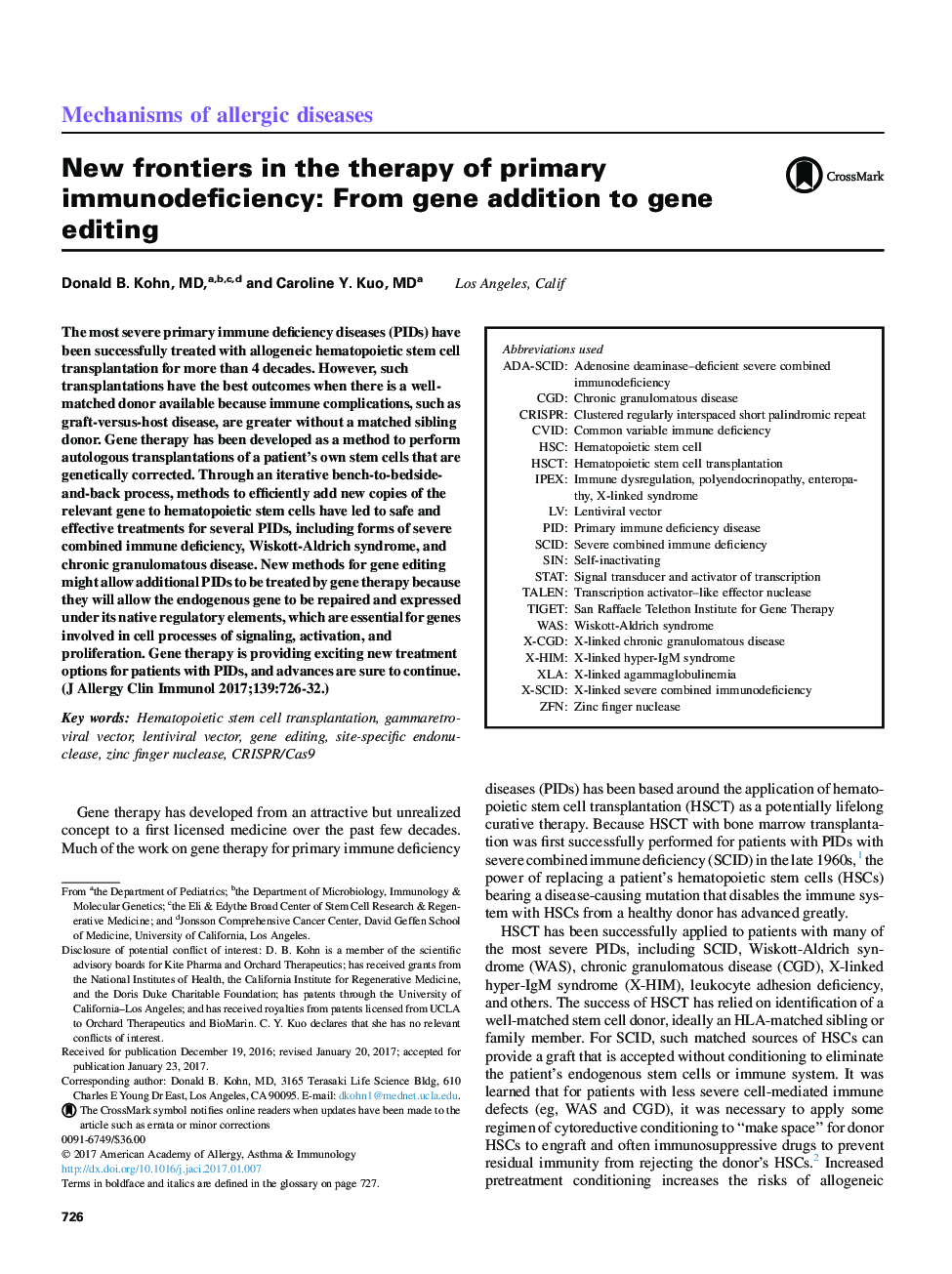| کد مقاله | کد نشریه | سال انتشار | مقاله انگلیسی | نسخه تمام متن |
|---|---|---|---|---|
| 5646822 | 1407072 | 2017 | 7 صفحه PDF | دانلود رایگان |
عنوان انگلیسی مقاله ISI
New frontiers in the therapy of primary immunodeficiency: From gene addition to gene editing
ترجمه فارسی عنوان
مرزهای جدید در درمان ابتلا به کمبود ایمنی: از افزودن ژن به ویرایش ژن
دانلود مقاله + سفارش ترجمه
دانلود مقاله ISI انگلیسی
رایگان برای ایرانیان
کلمات کلیدی
CVIDself-inactivatingX-SCIDX-linked chronic granulomatous diseaseZFNADA-SCIDX-linked hyper-IgM syndromeimmune dysregulation, polyendocrinopathy, enteropathy, X-linked syndromeIPEXXLAHSCHSCTCGDCRISPRSCIDPIDCRISPR/Cas9 - CRISPR / Cas9STAT - آمارX-linked agammaglobulinemia - اگاماگلوبولینمی مرتبط با Xsin - بدونLentiviral vector - بردار Lentiviralclustered regularly interspaced short palindromic repeat - به طور منظم تکرار پیلندرومی کوتاه مدت میان دو طرف تقسیم می شودWAS - بودchronic granulomatous disease - بیماری گرانولوماتوز مزمنTALEN - زبان هاHematopoietic stem cell - سلول بنیادی هماتوپوئیتWiskott-Aldrich syndrome - سندرم Wiskott-AldrichSignal transducer and activator of transcription - مبدل سیگنال و فعال کننده رونویسیzinc finger nuclease - نیکلاز انگشت رویGene editing - ویرایش ژنHematopoietic stem cell transplantation - پیوند مغز استخوانX-linked severe combined immunodeficiency - کمبود ایمنی همراه با X مرتبط استCommon variable immune deficiency - کمبود سیستم ایمنی متغیرSevere combined immune deficiency - کمبود شدید کمبود ایمنی
موضوعات مرتبط
علوم زیستی و بیوفناوری
ایمنی شناسی و میکروب شناسی
ایمونولوژی
چکیده انگلیسی
The most severe primary immune deficiency diseases (PIDs) have been successfully treated with allogeneic hematopoietic stem cell transplantation for more than 4Â decades. However, such transplantations have the best outcomes when there is a well-matched donor available because immune complications, such as graft-versus-host disease, are greater without a matched sibling donor. Gene therapy has been developed as a method to perform autologous transplantations of a patient's own stem cells that are genetically corrected. Through an iterative bench-to-bedside-and-back process, methods to efficiently add new copies of the relevant gene to hematopoietic stem cells have led to safe and effective treatments for several PIDs, including forms of severe combined immune deficiency, Wiskott-Aldrich syndrome, and chronic granulomatous disease. New methods for gene editing might allow additional PIDs to be treated by gene therapy because they will allow the endogenous gene to be repaired and expressed under its native regulatory elements, which are essential for genes involved in cell processes of signaling, activation, and proliferation. Gene therapy is providing exciting new treatment options for patients with PIDs, and advances are sure to continue.
ناشر
Database: Elsevier - ScienceDirect (ساینس دایرکت)
Journal: Journal of Allergy and Clinical Immunology - Volume 139, Issue 3, March 2017, Pages 726-732
Journal: Journal of Allergy and Clinical Immunology - Volume 139, Issue 3, March 2017, Pages 726-732
نویسندگان
Donald B. MD, Caroline Y. MD,
